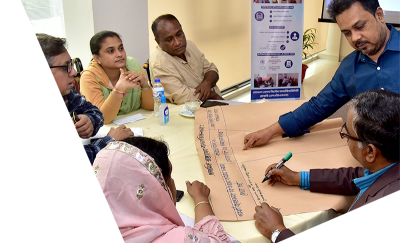

If you’re trying to articulate how a program works, a picture is worth a thousand words. That’s why we’ve developed a playbook that illustrates six different types of program theories: to help program developers and evaluators guide and share their work (with pictures doing the heavy lifting). Program theories are visuals that describe how a program is intended to bring about a desired outcome. For program developers, program theories can help staff gain a shared understanding of the program and what they need to do to make an impact. For evaluators, program theories can help organize an evaluation design by providing a framework for understanding what to measure and how different parts of a program are hypothesized to affect outcomes.
Our primary motivation in developing this playbook is to spark creativity in the articulation of a program’s activities and outcomes, so think of this as a starting point—we encourage you to play around with the different templates to develop program theories that best meet your needs. It’s a playbook, play around! The playbook illustrates six different program theories:


These different types of program theories are not mutually exclusive. Program developers and evaluators can also create nested or hybrid models that combine different types of program theories. Combining different program theories allows you to examine and understand programs in different—but complementary—ways. For example, integrating causal loop diagraming in a theory of change can help drill down how certain activities within the theory of change can affect outcomes. Using nested or hybrid models allows you to create your own playbook.
Please let us know what you think, and good luck with whatever play you decide to run!
Want the full guide? Check out the Visualizing Program Theories page!

Experts from Abt Global will be presenting at the Association for Public Policy Analysis & Management (APPAM) 2024 Fall Research Conference.

A Conrad N. Hilton Foundation-funded, Abt-led evaluation studied three encampments in Los Angeles.

Abt Global is exhibiting and presenting at Health Systems Research (HSR) in Nagasaki, Japan in November 2024.

Abt’s long-term studies of career pathways and apprenticeship programs will provide critical new information on sustainability of participants’ earnings gains.


